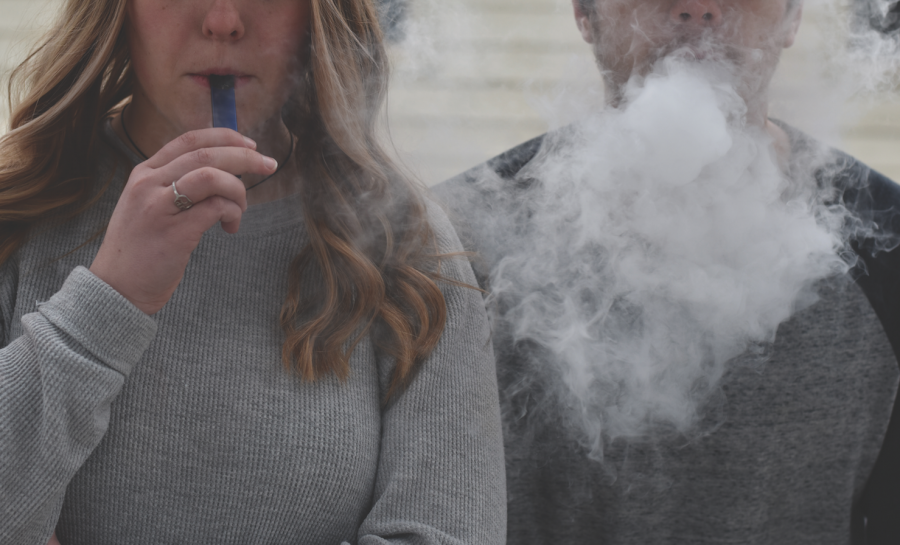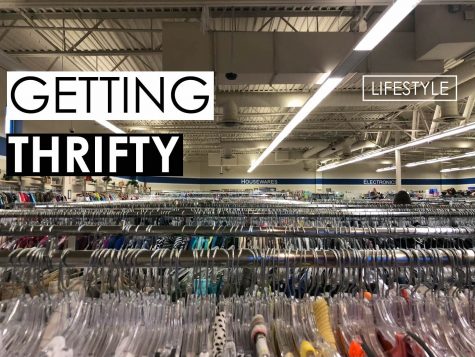TOO JUUL FOR SCHOOL
Students share the effects of vaping in and out of the educational setting
Vaping is a new trend at Sandpoint High School and is beginning to negatively effect students and administration.
As of Sept. 2017, the Sandpoint High School administration has encountered over 20 incidents involving students and e-cigarette usage. The use of e-cigs, or vapes by students has become more common in the halls of not only SHS, but nationwide, as other schools are dealing with minors possessing the illegal item.
This alternative to smoking cigarettes is becoming more popular among minors, due to the smaller size, discrete vapor cloud and smell of vapes. Vapes are either used for tricks, like blowing large clouds of vapor, or for the nicotine buzz.
The liquid nicotine in vapes is offered in a variety of flavors such as mint, crème brûlée and berry splash. The companies specifically market their products to children and teens, as the sweet and fruity flavors appeal to younger consumers.
Over the last few years, the presence of e-cigarettes problems has significantly increased at SHS. Within the last month, Juuls have become more prominent over other e-cig brands. A Juul resembles a small USB drive and is easily concealed, making it much more difficult to be identified.
Vice Principal Derek Dickinson has dealt with a wide range of students who have possessed vapes at school, or been caught vaping on campus. While 18-year-old students can legally purchase and own e-cigarettes, a large majority of the students being caught with vaping products are juniors and underclassmen.
“It’s a trend, and I don’t know if it’s one that is going to stick around. I don’t know why people have an infatuation with putting things in their lungs, whether it be from cigarettes before and now its the vapes,” Dickinson said.
When a student is found with a vape, it is treated like a tobacco offense: The item is confiscated and the student will have at least one day of in school suspension if they are under 18 years of age, and, depending on circumstances, other additional punishments may apply. Parents are always contacted when dealing with this type of offense.
Recently, an additional program has been added for students who have been caught using tobacco or e-cig products on school grounds. The online educational program titled “Nicotine 101” requires students to complete the online class emphasizing the different elements of using an e-cig and the repercussions of vaping on one’s health.
Junior Kyle Mills first began vaping as a freshman. Mills received a sponsorship from a vape company called VGOD at the end of his freshman year that lasted for six months.
VGOD supplied Mills with clothes, vapes and vape juice in order to promote their product, however, the sponsorship was terminated, as he began to view vaping as more of a fun hobby rather than a competitive sport.
“Vaping could be a problem because the school as a whole does not allow it,” Mills said, “But I see it more as a healthy alternative to what is even worse, cigarettes.”
Marilyn Cupery, the Clinical Supervisor of the Cardiopulmonary Department at Bonner General Health, expressed that because nicotine is an addictive substance, reversing the effects of copious amounts of nicotine use is notoriously difficult, borderline impossible. Nicotine addiction and abuse can lead to damage of developing brains, hearts, lungs, as well the risk of cancer.
Cupery stresses that lungs are meant to take in oxygen in exchange for carbon dioxide. Any excess substances that are inhaled will only break down and destroy the essential tissue within the lungs. When a person continuously inhales nicotine vapor and smoke, the damage to the lung tissue is permanent, and irreversible.
“Why would anyone purposefully inhale anything that could destroy the organs that are so essential to life?” Cupery said.
Senior Saige Hallock believes that at SHS, vaping is a problematic practice that is prevalent among many students. Hallock states that these devices become a distraction to her education. She believes that students use e-cigs to feel cool.
“Because there is less research being conducted about the ramifications that vaping has on your health, there is a misconception that it’s healthier for you. People do this because they do not want to get cancer but they don’t realize that it’s still bad for you.” Hallock said.

Addi House is a senior and it is her second year on staff. Here are some fun facts about Addi.
What’s the last movie you cried at?
After I had...










